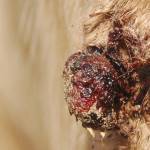Mistletoe for Sarcoid Treatment

Sarcoids are the most frequently diagnosed tumors in horses, accounting for 20% of all tumors and 36% of all skin tumors. They can form on the face, ears, body, and legs and are thought to be caused by the bovine papilloma virus.
Sarcoids are usually harmless unless they occur in areas where they can be easily irritated by tack, blankets, or other equipment. Rubbing causes the tumors to break open and bleed, triggering pain and inviting infection.
These tumors are notoriously hard to get rid of, and frequently recur even after surgical removal. A new treatment involving an extract of mistletoe shows great promise. In a research trial in Switzerland, mistletoe extract was injected under the skin near the tumors three times a week for 15 weeks. Control horses received injections of saline. In treated horses, sarcoids regressed partially or completely in 41% of horses compared to 14% of control horses. Numbers for individual tumors, as opposed to individual horses, showed that 67% of treated tumors completely or partially regressed in treated horses compared to 40% in untreated horses. There was also evidence that, in horses with some treated tumors, there was regression of untreated tumors as well, showing a possible systemic effect. The treatment didn’t cause visible results immediately, with some tumors showing no change until the end of the 15-week program. The study is being continued to see whether the regressed tumors recur.
Mistletoe extract is one of the most recent developments in sarcoid treatment. Cisplatin, a chemotherapy drug also used to treat melanoma, has proven effective against sarcoids. Cisplatin spreads slowly into the tumor cells and is sometimes mixed with sesame oil to prolong its presence at the tumor site and greatly enhance diffusion. Even better results have been achieved when electrostimulation of the tumor site was done five minutes after cisplatin was injected. The electric pulses sent the drug into the tumor tissue, leading to a higher drug concentration and more effective destruction of cells. Up to 90% of treated tumors regressed, with no regrowth for at least two years.
Another method of cisplatin treatment uses biodegradable beads implanted into a tumor site. The beads dispense cisplatin continuously over a month-long period, after which fresh beads can be implanted. Sarcoids were variable in their response in one study, requiring between two and twelve treatments to remove the tumors. Horses in this study showed no regrowth in 83% of cases.








